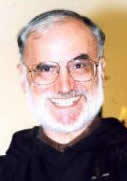Let us take the point of departure for our reflection from what Jesus says to the disciples of John to reassure them he is the Messiah: "Glad tidings are announced to the poor."
The Gospel is a message of joy: The liturgy proclaims this on the Third Sunday of Advent, which, from the words of St. Paul in the opening antiphon, has taken the name "Gaudete Sunday" -- Rejoice Sunday, the Sunday of joy. The first reading, taken from the prophet Isaiah, is a hymn to joy: "The desert and the wasteland rejoice ... They sing with joy and jubilation ... They will be crowned with everlasting happiness; they will meet with joy and felicity and sadness and mourning will flee."
Everyone wants to be happy. If we could represent the whole of humanity to ourselves, in its deepest movement, we would see an immense crowd about a fruit tree on the tips of its toes desperately stretching out its hands in the attempt to lay hold of a piece of fruit that constantly eludes it. Happiness, Dante said, is "quell dolce pome che per tanti rami / cercando va la cura de' tanti mortali" -- "that sweet fruit that mortals seek / and strive to find on many boughs."
But if all of us are searching for happiness, why are so few truly happy and even those who are happy are only happy for such a short time? I believe that the principle reason is that, in our climb to the summit of the mountain, we go up the wrong side, we decide to take the wrong way up. Revelation says: "God is love," but man has tried to reverse the phrase so that it says: "Love is God"! (That is what the German philosopher Ludwig Feuerbach said.)
Revelation says: "God is happiness," but man again inverts the order and says "Happiness is God"! But what happens here? On earth we do not know pure happiness, just as we do not know absolute love; we only know bits and pieces of happiness, which often become mere passing stimulation of our senses. Thus, when we say, "Happiness is God," we divinize our little experiences; we call the works of our own hands or our own minds "God." We make happiness into an idol. This explains why he who seeks God always finds joy while he who seeks joy does not always find God. Man is reduced to looking for quantitative joy: chasing down ever more intense pleasures and emotions, or adding pleasure to pleasure -- just as the drug addict needs bigger and bigger doses to obtain the same level of pleasure.
Only God is happy and makes happy. This is why a psalm says: "Seek joy in the Lord, he will fulfill the desires of your heart" (Psalm 4). With him even the joys of the present life retain their sweet savor and do not change into anxiety. I am not only speaking of spiritual joys but all honest human joy: the joy of seeing your children grow, work brought happily to conclusion, friendship, health regained, creativity, art, leisure and contact with nature. Only God was able to draw from the lips of a saint the cry "Enough joy, Lord! My heart can hold no more!" In God is found all of that which man usually associates with the word "happiness" and infinitely more, since "eye has not seen nor ear heard nor has it entered the heart of man that which God has prepared for those who love him" (cf. 1 Corinthians 2:9).
It is time to proclaim with greater courage the "glad tidings" that God is happiness, that happiness -- not suffering, deprivation, the cross -- will have the last word. Suffering only serves to remove obstacles to joy, to open the soul, so that one day we can receive the greatest possible measure.
[Translation by Joseph G. Trabbic]
* * *
Father Raniero Cantalamessa is the Pontifical Household preacher. The readings for today are Isaiah 35:1-6a, 8a, 10; James 5:7-10; Matthew 11:2-11.

Fr.
Raniero Cantalamessa is a Franciscan
Capuchin Catholic Priest. Born in Ascoli Piceno,
Italy, 22 July 1934, ordained priest in 1958.
Divinity Doctor and Doctor in classical literature.
In 1980 he was appointed by Pope John Paul II
Preacher to the Papal Household in which capacity he
still serves, preaching a weekly sermon in Advent
and Lent.
